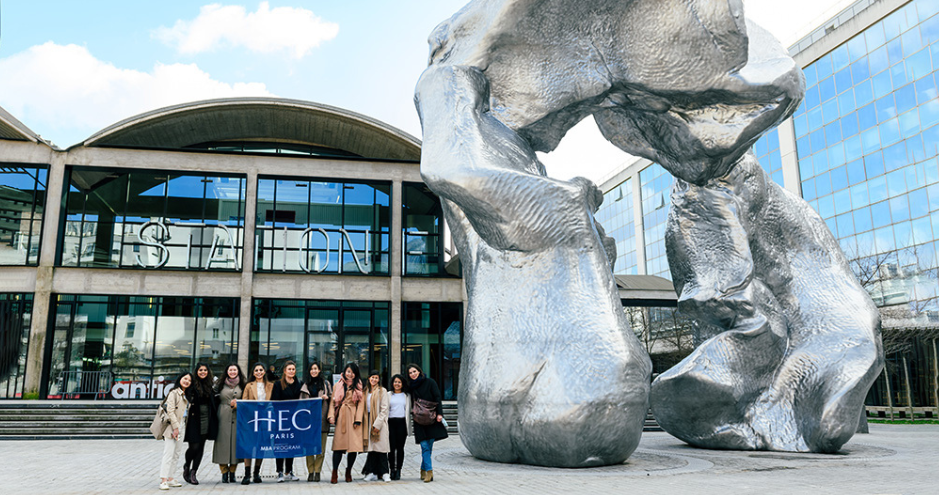Professor Shaheena Janjuha-Jivraj shares her Tips for Women Entrepreneurs
Professor Shaheena Janjuha-Jivraj shares her Tips for Women EntrepreneursHEC's Women in Leadership Club toured Station F, engaging with successful female entrepreneurs and receiving insights from HEC Associate Professor Shaheena Janjuha-Jivraj. With a 85% startup survival rate, HEC fosters entrepreneurship. Professor Janjuha-Jivraj shared invaluable tips, advocating for adaptability, diverse teams, trust in co-founders, assertiveness in financing and networking, and self-promotion.

Even though it’s decorated with whimsical artwork, foosball tables and even the occasional wooden dinosaur, Station F is a breeding ground for serious business. A thousand startups occupy this 370,000 square foot, “as-long-as-the-Eiffel-Tower” campus housed in a former Parisian railway depot.

In the HEC Incubateur, which fills a vast space on Station F’s upper floor, 150 startups per year receive mentorship and other forms of early-stage assistance. It’s in this buzzing space that 9 out of France’s 24 unicorns were catapulted to their stratospheric success. Overall, startups incubated by HEC boast an impressive 85 percent survival rate 3 years out. Such achievements help explain why the HEC Paris MBA’s Women in Leadership (WIL) Club chose to tour Station F for the latest installment in its “Women who Inspire” series.
“We were really looking for a way to motivate women to take up entrepreneurship,” explains current WIL President Tejal Pradhan, MBA ’23. “We wanted to hear firsthand from women leaders and founders, and understand more about the startup ecosystem in general.” With more than 70 students from across all HEC Paris programs interested in participating, the MBA’s WIL club organized two “mini-tours” of the startup campus, one on February 17 and the other in March.
“The demand has just been overwhelming,” Tejal said. “It wasn’t just the chance to tour the startup campus, but also to hear from such dynamic speakers.”

(photo by madetoshow)
Anna Schwarz, program manager for HEC Incubateur, led the three-hour tour, which included Q&A sessions with two HEC alumni currently working at Station F: Clemence Demerliac, founder of AdAlong, and Juliette Lailler, co-founder of Krème.
While the female entrepreneurs detailed their personal trials and triumphs involved in starting their businesses, HEC Paris in Qatar Associate Professor Shaheena Janjuha-Jivraj gave an overview of the current state of support worldwide for female founders. “The big problem we’re facing in Europe is that only 5% of entrepreneurs are women,” she says. “That goes up to 11% throughout the world, still far from the parity that should be there.”
As a book author, Forbes contributor, and expert in the fields of diversity, leadership and innovation, Professor Janjuha-Jivraj shared many helpful tips about founding a business. Her insights came from years of working with entrepreneurs globally, her academic research and her own experience as the co-founder of a business consultancy group.
Important tips for women entrepreneurs distilled from Professor Janjuha-Jivraj’s presentation:
1. Recognize your initial business concept will need to change – and be open to those changes.
When you start to develop your business ideas, you tend to lose your objectivity and fall in love with your ideas. That’s why you need to learn the analytic tools associated with entrepreneurship and the lean startup process. At HEC Paris, you learn those tools and you learn to apply them, so much so that they become part of your being. These tools will help you to analyze the strengths and weaknesses of your business ideas, providing you with objectivity and insight for short- and long-term decision making. The opportunity for entrepreneurship lies in collaborating in new areas of innovation.
HEC also has programs such as CDL-Paris, which are a great way to gain a thorough understanding of every aspect of entrepreneurship and identify opportunities in new areas of innovation.

(photo by madetoshow)
2. Surround yourself with people who think differently than you.
As an entrepreneur, you have the unique opportunity to create your team. In most cases, there is a tendency to find people who think like you, leading to confirmation bias in decision-making. But when you are in a program like HEC Paris, you have the most amazing opportunity to work with people with whom you wouldn’t normally socialize. Not only does that allow you to flex your muscles and learn to work with people who have a different perspective than you, but there’s a real value to seeing the world through someone else’s eyes. You have the opportunity to experience working in groups with cognitive diversity and build up your resistance to group-think. There is a correlation between group diversity and revenue-based innovation. This is essential for entrepreneurial ventures.
3. When looking for co-founders, find someone you trust.
I would argue that the number one rule for finding a co-founder is the same for finding a life partner: make sure that you trust the person. Your values need to align on everything from how you split money to how you make decisions and the ethics of how you do things. It doesn’t matter how brilliant they are or how much you enjoy working with them, if your values aren’t aligned then it’s difficult to set the culture and tone for the business. The specific challenge is to have aligned values but still bring different experiences and perspectives to the table.

(photo by madetoshow)
4. When seeking financing, be bold when requesting resources.
Funding a startup is tough. Research has shown—and this hasn’t changed for decades—that men are better at asking for more money for more risky ventures. Women tend to be less aggressive and ask for less financing then they actually need, which leads them to under-resource their businesses.
The double-edged sword is that funding opportunities for startups, and VC funding for female-run businesses, is lower than for their male counterparts. More attention is focused on resources for female entrepreneurs but it’s important for women to be confident and request the resources necessary to facilitate the growth of their business.
5. When building your network, strive for a balance of different networks.
Networks are essential for entrepreneurs to build their resources and social capital. There is a difference in the way men and women network. In general, men have access to wider networks, and are far more transactional in their networking. Women have more limited networks, but what is more interesting is women use their networks in a more supportive way than the business transactional approach.
You want to try and build transactional networks, because that’s where the business opportunities emerge. I’ve seen this behavior on LinkedIn, where women will network with me, saying ‘this is really nice’, while men won’t hesitate to ask, ‘can you do this, this, and this for me?’
Again this comes back to female entrepreneurs being more assertive in asking for what they need.
6. Self-advocacy is a big part of entrepreneurship.
You need to get really comfortable in building and promoting your entrepreneurial brand. Entrepreneurial branding is increasingly important in business brand recognition. Recognizing your brand as a commodity means you will promote yourself. It can seem uncomfortable or vulgar to self-promote but you need to draw attention to your business and what you stand for.
Once you start doing it you will realize how common it is and important for you to shape your narrative as an entrepreneur. It also helps you to step out of your comfort zone and become bolder.